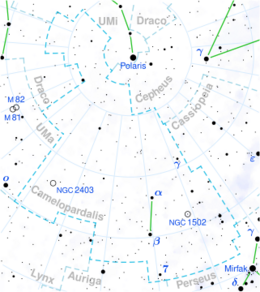Astronomy:HD 23523
| Observation data Epoch J2000.0 Equinox (celestial coordinates) | |
|---|---|
| Constellation | Camelopardalis |
| Right ascension | 03h 49m 36.58592s[1] |
| Declination | +63° 17′ 49.0518″[1] |
| Apparent magnitude (V) | 5.82[2] (6.31 + 7.11)[3] |
| Characteristics | |
| Spectral type | A5 Vn[4] |
| B−V color index | +0.18[5] |
| Astrometry | |
| Radial velocity (Rv) | −9.6±3.4[6] km/s |
| Proper motion (μ) | RA: −11.630[1] mas/yr Dec.: −61.457[1] mas/yr |
| Parallax (π) | 13.9498 ± 0.3245[1] mas |
| Distance | 234 ± 5 ly (72 ± 2 pc) |
| Absolute magnitude (MV) | +1.55[7] (combined) |
| Orbit[8] | |
| Primary | HD 23523A[3] |
| Companion | HD 23523B[3] |
| Period (P) | 10.180±0.509 yr |
| Semi-major axis (a) | 0.1020±0.0031″ |
| Eccentricity (e) | 0.441 |
| Details | |
| A | |
| Mass | 1.75 or 1.81[9] M☉ |
| B | |
| Mass | 1.64 or 1.51[9] M☉ |
| Other designations | |
| Database references | |
| SIMBAD | data |
HD 23523 (HR 1158) is a binary star[11] located in the northern circumpolar constellation Camelopardalis. It has a combined apparent magnitude of 5.82,[2] making it faintly visible to the naked eye under ideal conditions. When resolved, the primary has an apparent magnitude of 6.31 while the secondary has a magntiude of 7.11.[3] The system is located relatively close at a distance of about 234 light-years based on Gaia DR3 parallax measurements[1] and it currently drifting closer with a somewhat heliocentric radial velocity of −9.6 km/s.[6] At its current distance, HD 23523's combined brightness is diminished by 0.16 magnitudes due to interstellar extinction[12] and it has a combined absolute magnitude of +1.55.[7]
The system was first discovered to be a double star in 1996 by Marcel Carbillet and colleagues after speckle interferometry observations.[13] The stars are only about a tenth of an arcsecond apart,[3] making observing their individual properties difficult. The discovery paper suggested that the two components might be equal based on the dynamical mass.[13] Overall, HD 23523 has a stellar classification of A5 Vn,[4] indicating that it is an A-type main-sequence star with broad or nebulous absorption lines due to rapid rotation. The primary has a mass either 1.75 or 1.81 times the mass of the Sun while the companion has a mass 1.64 or 1.51 times that of the Sun,[9] depending on the approach.
References
- ↑ 1.0 1.1 1.2 1.3 1.4 Vallenari, A. et al. (2022). "Gaia Data Release 3. Summary of the content and survey properties". Astronomy & Astrophysics. doi:10.1051/0004-6361/202243940 Gaia DR3 record for this source at VizieR.
- ↑ 2.0 2.1 Høg, E.; Fabricius, C.; Makarov, V. V.; Urban, S.; Corbin, T.; Wycoff, G.; Bastian, U.; Schwekendiek, P. et al. (March 2000). "The Tycho-2 catalogue of the 2.5 million brightest stars". Astronomy and Astrophysics 355: L27–L30. ISSN 0004-6361. Bibcode: 2000A&A...355L..27H.
- ↑ 3.0 3.1 3.2 3.3 3.4 Mason, Brian D.; Wycoff, Gary L.; Hartkopf, William I.; Douglass, Geoffrey G.; Worley, Charles E. (December 2001). "The 2001 US Naval Observatory Double Star CD-ROM. I. The Washington Double Star Catalog". The Astronomical Journal 122 (6): 3466–3471. doi:10.1086/323920. ISSN 0004-6256. Bibcode: 2001AJ....122.3466M.
- ↑ 4.0 4.1 Cowley, A.; Cowley, C.; Jaschek, M.; Jaschek, C. (April 1969). "A study of the bright stars. I. A catalogue of spectral classifications.". The Astronomical Journal 74: 375. doi:10.1086/110819. ISSN 0004-6256. Bibcode: 1969AJ.....74..375C.
- ↑ Ljunggren, B.; Oja, T. (1965). "Photoelectric measurements of magnitudes and colours for 849 stars". Arkiv för Astronomi 3: 439–465. ISSN 0004-2048. Bibcode: 1965ArA.....3..439L.
- ↑ 6.0 6.1 Gontcharov, G. A. (November 2006). "Pulkovo Compilation of Radial Velocities for 35,495 Hipparcos stars in a common system". Astronomy Letters 32 (11): 759–771. doi:10.1134/S1063773706110065. ISSN 1063-7737. Bibcode: 2006AstL...32..759G.
- ↑ 7.0 7.1 Anderson, E.; Francis, Ch. (May 2012). "XHIP: An extended hipparcos compilation". Astronomy Letters 38 (5): 331–346. doi:10.1134/S1063773712050015. ISSN 1063-7737. Bibcode: 2012AstL...38..331A.
- ↑ Malkov, O. Yu.; Tamazian, V. S.; Docobo, J. A.; Chulkov, D. A. (October 2012). "Dynamical masses of a selected sample of orbital binaries". Astronomy & Astrophysics 546: A69. doi:10.1051/0004-6361/201219774. ISSN 0004-6361. Bibcode: 2012A&A...546A..69M.
- ↑ 9.0 9.1 9.2 Cvetkovic, Zorica; Ninkovic, S. (June 2010). "On the component masses of visual binaries". Serbian Astronomical Journal 180 (180): 71–80. doi:10.2298/SAJ1080071C. Bibcode: 2010SerAJ.180...71C.
- ↑ "HD 23523". SIMBAD. Centre de données astronomiques de Strasbourg. http://simbad.u-strasbg.fr/simbad/sim-basic?Ident=HD+23523.
- ↑ Eggleton, P. P.; Tokovinin, A. A. (11 September 2008). "A catalogue of multiplicity among bright stellar systems". Monthly Notices of the Royal Astronomical Society 389 (2): 869–879. doi:10.1111/j.1365-2966.2008.13596.x. ISSN 0035-8711. Bibcode: 2008MNRAS.389..869E.
- ↑ Gontcharov, George A.; Mosenkov, Aleksandr V. (28 September 2017). "Verifying reddening and extinction for Gaia DR1 TGAS main sequence stars". Monthly Notices of the Royal Astronomical Society 472 (4): 3805–3820. doi:10.1093/mnras/stx2219. ISSN 0035-8711. Bibcode: 2017MNRAS.472.3805G.
- ↑ 13.0 13.1 Carbillet, M.; Lopez, B.; Aristidi, E.; Bresson, Y.; Aime, C.; Ricort, G.; Prieur, J. -L.; Koechlin, L. et al. (October 1996). "Discovery of a new bright close double star.". Astronomy and Astrophysics 314: 112–114. ISSN 0004-6361. Bibcode: 1996A&A...314..112C.
 |

